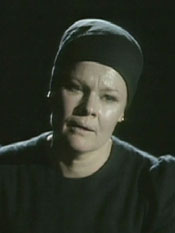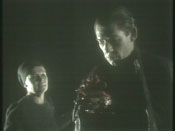 When
it was announced that Judi Dench would play Lady Macbeth for the Royal
Shakespeare Company in 1976, she was anticipated to be the victim of a grievous
example of miscasting. The warm and down-to-earth Dench (arguably the most beloved
actress since Ellen Terry) - noted for her unforgettable performances of Shakespearean
ingenue roles like Juliet in Romeo and Juliet and Isabella in Measure
for Measure and non-Shakespearean characters like Sally Bowles in Cabaret
and Anya in The Cherry Orchard - was thought to be outside her range
as Shakespeare's murderous Gorgon. But Dench's staggering versatility managed
to supersede audience preconceptions and, aided by Trevor Nunn's remarkable
minimalist staging and the unforgettable support of Ian McKellen in the title
role, she gave not only what is regarded as the greatest performance of her
own blue chip career, but put her personal stamp on perhaps the greatest production
of the play in its 400 year history. Nunn and Company did away with the normally
unlucky play's history of bagpipes and overwhelming sets and a faux-Scottish
setting that fails to support the dramatic action, and reimagined it as a simple
and richly theatrical experience that turned the play's mayhem into both an
unsettling nightmare of gore and a sublimely human drama of ambition gone horribly
out of control. Dench won the first of her record six Laurence Olivier Awards
for her portrayal, and a 2004 poll of members of the Royal Shakespeare Company
voted Dench's Lady Macbeth as the greatest Shakespearean performance by an actress
in the history of the RSC.
When
it was announced that Judi Dench would play Lady Macbeth for the Royal
Shakespeare Company in 1976, she was anticipated to be the victim of a grievous
example of miscasting. The warm and down-to-earth Dench (arguably the most beloved
actress since Ellen Terry) - noted for her unforgettable performances of Shakespearean
ingenue roles like Juliet in Romeo and Juliet and Isabella in Measure
for Measure and non-Shakespearean characters like Sally Bowles in Cabaret
and Anya in The Cherry Orchard - was thought to be outside her range
as Shakespeare's murderous Gorgon. But Dench's staggering versatility managed
to supersede audience preconceptions and, aided by Trevor Nunn's remarkable
minimalist staging and the unforgettable support of Ian McKellen in the title
role, she gave not only what is regarded as the greatest performance of her
own blue chip career, but put her personal stamp on perhaps the greatest production
of the play in its 400 year history. Nunn and Company did away with the normally
unlucky play's history of bagpipes and overwhelming sets and a faux-Scottish
setting that fails to support the dramatic action, and reimagined it as a simple
and richly theatrical experience that turned the play's mayhem into both an
unsettling nightmare of gore and a sublimely human drama of ambition gone horribly
out of control. Dench won the first of her record six Laurence Olivier Awards
for her portrayal, and a 2004 poll of members of the Royal Shakespeare Company
voted Dench's Lady Macbeth as the greatest Shakespearean performance by an actress
in the history of the RSC.
 Fortunately
for posterity, the production was filmed for television in 1979 - certainly
the most effective film of the play ever made. "The effect of the production
can still be felt, by viewing the television version," wrote McKellen."Trevor
said: 'I want to photograph the text'. So again, there were no scenic effects,
just groupings and close-ups in shadows and coloured light. The actors' familiarity
with the production and with each other, meant we could concentrate on hitting
our marks on the studio floor, without worry or waste of time." Dench was
nominated for a BAFTA Award for the television production, which is readily
available on DVD, only a handful of her masterful Shakespearean roles that have
been immortalized on film along with her Titania in A Midsummer Night's
Dream (1968), Mistress Quickly in Henry V (1989) and a nonspeaking
cameo as Hecuba in the overlong and muddled 1996 film of Hamlet. She
continued performing on the the Shakespearean stage, winning another Olivier
Award for Antony and Cleopatra in 1996, but it is the unfortunate reality
of the Bard's canon that there are no mature female roles for an actress of
Dench's caliber and it is unlikely that we will see her give another Shakespearean
performance. The loss makes it all the more fortunate that her legendary Lady
Macbeth has been preserved on video.
Fortunately
for posterity, the production was filmed for television in 1979 - certainly
the most effective film of the play ever made. "The effect of the production
can still be felt, by viewing the television version," wrote McKellen."Trevor
said: 'I want to photograph the text'. So again, there were no scenic effects,
just groupings and close-ups in shadows and coloured light. The actors' familiarity
with the production and with each other, meant we could concentrate on hitting
our marks on the studio floor, without worry or waste of time." Dench was
nominated for a BAFTA Award for the television production, which is readily
available on DVD, only a handful of her masterful Shakespearean roles that have
been immortalized on film along with her Titania in A Midsummer Night's
Dream (1968), Mistress Quickly in Henry V (1989) and a nonspeaking
cameo as Hecuba in the overlong and muddled 1996 film of Hamlet. She
continued performing on the the Shakespearean stage, winning another Olivier
Award for Antony and Cleopatra in 1996, but it is the unfortunate reality
of the Bard's canon that there are no mature female roles for an actress of
Dench's caliber and it is unlikely that we will see her give another Shakespearean
performance. The loss makes it all the more fortunate that her legendary Lady
Macbeth has been preserved on video.